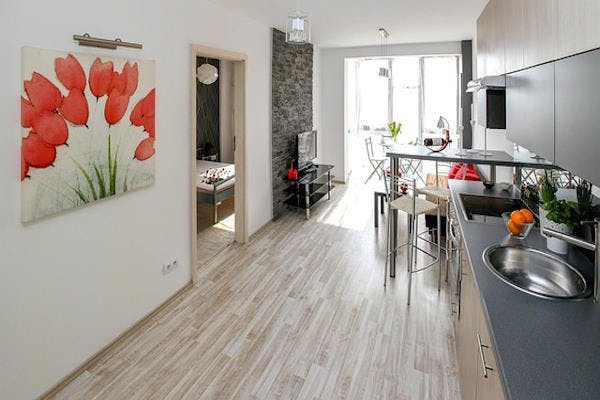
Sharing an apartment is an increasingly popular option for renters, especially in large cities where rents can be high. While sharing a space with roommates can be cost-effective, it also comes with its challenges. Here’s a look at the main pros and cons of sharing an apartment to help you decide if it’s right for you.
Pros of Sharing an Apartment
1. Cost Savings: The main benefit of living in a shared apartment is cost savings. By sharing the rent and bills with other people, you can save a significant portion of your monthly budget. This makes sharing an apartment particularly advantageous in large cities where the cost of living is high.
2. Access to Larger Spaces: With a shared apartment, you can often afford a larger or better located place than if you were renting alone. Rather than living in a cramped studio, sharing gives you access to spacious apartments with several common areas such as the living room, kitchen or even a balcony.
3. Shared Household: Chores Living with roommates also means sharing household chores, which can lighten the workload for each resident. By setting up a chore schedule, each roommate can take on certain chores such as cleaning the bathroom, cooking, or waste management. This helps keep the space clean and tidy without having to rely on one person for everything.
4. Expanded Social Network: Sharing a flat is often a great way to meet new people and expand your social circle. Roommates can become good friends or at least acquaintances with whom you can share activities or outings. This is a particularly interesting option for newcomers to a city, who can avoid loneliness.
5. Learning to Live with Others: Sharing a flat offers a unique opportunity to develop skills in communication, compromise and conflict management. Living with others teaches you to be patient, adapt to each other’s habits, and resolve disagreements constructively. These skills are valuable in both your personal and professional life.
6. Flexibility: Sharing a flat can sometimes offer more flexibility in terms of rental duration. Some flatmates prefer short-term rental agreements, and it’s common for rooms to be available more quickly than an entire apartment. This can be advantageous for those who don’t have long-term plans and are looking for a temporary solution.
Disadvantages of Shared Accommodation
1. Less Privacy: The main disadvantage of sharing an apartment is the reduced privacy. Living with other people means sharing spaces like the living room, kitchen, and sometimes the bathroom. This can be difficult for those who value their privacy or need a quiet environment to work or relax.
2. Different Lifestyle Habits: Each roommate brings their own lifestyle habits, which may not always match yours. This could include sleeping habits, music preferences, or ways of handling cleaning. Lifestyle differences can lead to tensions and disagreements if not managed well or compromised.
3. Risk of Conflict: Disagreements are inevitable in shared accommodation, whether it is about money, cleaning, or sharing common spaces. Conflicts can ruin the harmony of shared living and make the living environment stressful if tensions are not resolved. Open communication is essential to prevent minor disagreements from escalating.
4. Shared Responsibility for Bills: In shared accommodation, sharing bills can sometimes cause problems, especially if one roommate is late in paying their share. This can become a problem if electricity, internet or rent bills are not settled on time. In some cases, this can lead to additional charges or tensions between roommates.
5. Lack of Control over Roommate Selection: If you are joining an existing shared accommodation, you will not always have control over who your roommates are. This can be uncomfortable if you end up with someone whose lifestyle is radically different from yours. So it is essential to ask questions and get to know the other roommates before moving in, if possible.
6. Limitations on Decorating and Furnishing: Shared accommodations can be difficult to personalize, as you often need to get the approval of other roommates to change the layout or decorate common areas. This can limit your ability to truly feel at home in the accommodation, especially if you have particular tastes in decorating.
Conclusion:
By carefully weighing the pros and cons of sharing, you can decide whether this living arrangement is right for you. Shared accommodations can be a rewarding and cost-effective experience, but they also require good communication and a spirit of compromise to ensure a good living environment.